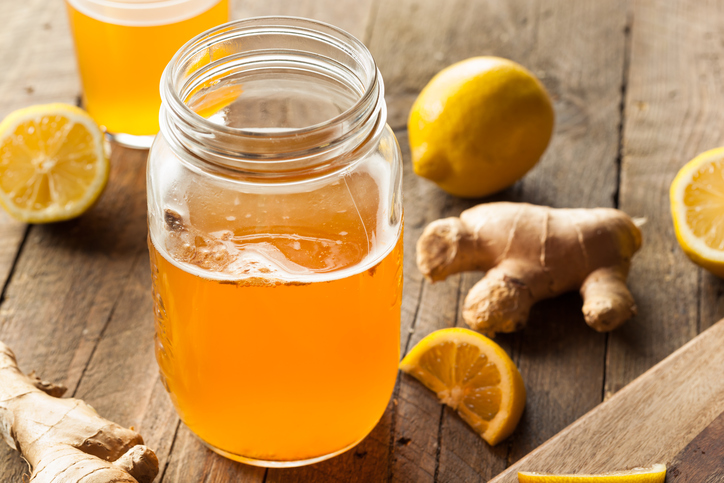Hey my friends,
It’s no secret that kombucha (a fermented probiotic tea) is one of my favorite beverages in all the land, but been awhile since I first wrote about it here: On A Magical Mystery Tour With Kombucha, 2008
Kombucha and I have been through a lot together. I even remember the olden days of yore (2010) when we had to walk up the hill both ways and live through the “Great Kombucha Recall” — that time they removed kombucha from supermarket shelves because of alcohol content. Those were dark days.
How much alcohol is in kombucha?
Finally, the day came when kombucha was reintroduced to us (I, of course, sprinted to the store), and the popular brand GT’s came out with with 2 different lines – “enlightened” (below .5% alcohol) and “classic” (above .5% alcohol) — although in general, even the “alcoholic” kombucha contains under 2.5% alcohol.
According to this article in Vice:
“Kombucha containing less than .5 percent alcohol by volume (ABV), considered non-alcoholic by the TTB (Alcohol and Tobacco Tax and Trade Bureau), only goes through a “primary fermentation” process of five to 30 days, depending on desired taste. (The sugar level decreases over time and the kombucha becomes more vinegary.) “Secondary fermentation” happens when the liquid is bottled and allowed time to develop its flavor and fizz; ABV levels can reach above .5 percent, up to 2.5 percent. In order to reach ABV levels in excess of 3 percent, the beverage must have grains added and go through a third fermentation, producing what brewers call “kombucha ale” or “probiotic beer.”
It’s quite difficult, even under optimal conditions, to reach 2.5 percent ABV. Home brews are generally .5 to 1.5 percent ABV.”
For reference, a bottle of non-alcoholic beer contains less than .5% alcohol and a bottle of alcoholic beer contains – on average – between 4% and 6%.
If we’re being honest here, it would be really difficult to drink more than 1 kombucha in a sitting. I rarely ever finish a whole one at once.
Anyway, this post is not about kombucha alcohol content, although it’s one of the main questions I get about kombucha.
This post is about my favorite flavor of kombucha, the one that has passed the test of time…since the days of yesteryear!!
That flavor is…
drumroll…
GINGER!
I’ve tried a lot of kombucha brands (ginger flavor) and I still prefer the taste of good old GT’s kombucha, but I’m happy to try any brand you guys recommend. I like this one because it’s not very sweet tasting – only 2g of sugar per serving (4g in a whole bottle).
The worst is a too-sweet kombucha. Yick.
I love ginger because it’s spicy, and so friendly to digestion – I always crave a ginger booch after a heavy meal. In fact, I wrote about ginger here in 10 Ayurvedic Remedies for Digestion.
And I always add extra ginger when I order a green juice – like this “I Am Healthy” juice recipe from my favorite California spot, Cafe Gratitude (see you soon!!)
Ginger is also supportive to the immune system, and I always reach for it when I feel like I’m getting sick. There have been many studies showing ginger’s anti-inflammatory effects, but I don’t need studies to know this warming little root is doing good things for me.
In Dr. John Douillard’s article, Ginger Magic, he says:
“Perhaps the holy grail of ginger is its reputation for pain and inflammation support.”
GO GINGER GO!
Read more from my friends at the Chopra Center: The Health Benefits of Ginger Tea
Learn more from the fabulous Wellness Mama: The Many Benefits Of Kombucha
And from LifeHack, 11 Benefits Of Ginger You Didn’t Know About
Here’s a recipe for homemade ginger kombucha. One day, mark my words, I shall make this.
Let’s hear it. Is ginger your favorite kombucha flavor too!? How could it not be!?
It’s spicy, sweet, fizzy, and it loves you.
What more could you ask for in a boochie?
Shooting stars and sparkly beverages,
Jenny



Asli Ceylan says
Hey Jenny, I love your blog! For Kombucha, I flavored it with clove and it was also so good too!
Jenny Sansouci says
Ooh – wow, that sounds awesome!